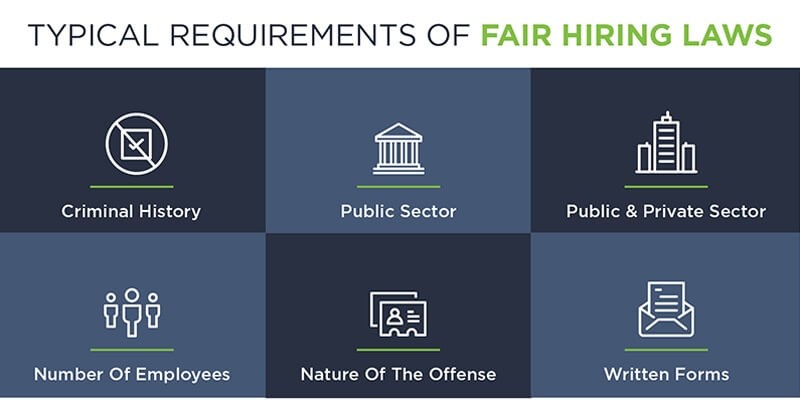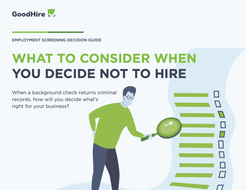Ban-the-Box
Ban-the-box laws are on the rise and failing to comply can mean costly fines. Learn which states ban the box and how to adjust your hiring process to stay compliant.
Jim Akin
10 min read
Click a chapter to scroll directly to it.
Fair chance hiring practices, which are designed to give ex-offenders a better chance at getting jobs, are gaining ground nationwide. Fair hiring laws and “ban the box” laws prohibit conducting criminal history inquiries until a conditional job offer is made, among other requirements.
Read this article to learn what fair hiring laws typically include and what they mean for hiring managers and job applicants.
People with criminal records (more than 70 million in the US) have a difficult time getting a job after paying their debts to society. In an effort to give ex-offenders a fair chance at securing work, a growing number of cities, counties, and states are passing fair hiring laws.
Fair hiring laws, commonly referred to as “ban the box” laws or fair-hiring policies, have been adopted in 150 cities and counties, and in 33 states since 2009. The intent behind the growing ban the box movement is to delay the criminal history inquiry (the box applicants check or don’t check) until later in the hiring process to allow ex-offenders the opportunity to present their true qualifications for jobs, and for employers to consider their applications in light of those qualifications, without having a criminal history prejudice the process.
Today, more than three-fourths of the US population lives in a jurisdiction with fair-chance policies in place.¹
While removing the box from job-application forms is one aspect of fair hiring laws, there are many aspects to these policies that employers must consider.
Three of the nation’s largest cities have passed fair chance laws, and the policies are often emulated:
San Francisco Fair Chance Ordinance: As passed in 2014, the San Francisco Fair Chance Ordinance applied to all city businesses with 20 or more employees; an October 2018 revision extends the law to all companies with five or more employees.
Los Angeles Fair Chance Initiative for Hiring: LA’s fair chance law took effect in January 2017, and is considered one of the country’s most comprehensive ban the box measures. Like the San Francisco Fair Chance Ordinance, it calls for employer penalties of $500 for the first failure to comply; $1,000 for a second offense; and $2,000 for subsequent violations.
New York City Fair Chance Act: The NYC Fair Chance Act was passed in 2015. The NYC background check law extends to both public and private employers; bans ads that say “background check required” or “no felonies”; and forbids questions about criminal history during the job interview process.
Get peace of mind with built-in compliance features.
Details of ban the box laws vary by jurisdiction. Some apply only to hiring for public-sector jobs while others extend to all employers, public and private. Some exempt businesses with fewer than a certain number of employees (five, 10, 20, etc.). But most ban the box laws share provisions along these lines:

Employers who fail to comply with fair chance hiring laws are subject to civil penalties ranging from hundreds to thousands of dollars per incident. Non-compliance can also open employers up to unfair-hiring lawsuits.
Since fair chance hiring laws are relatively new, there isn’t conclusive evidence about their effectiveness. Academic studies to date offer mixed opinions, but offer some basis for optimism:
A 2016 study by economists Amanda Agan and Sonja Starr found that employers responded less often to job applications from candidates with traditionally African-American sounding names after ban the box laws were enacted than they did before.² That led the authors to conclude that ban the box laws may have an unintended backfire effect, prompting employers to avoid African-American candidates because of the disproportionately high percentage of African-Americans with criminal records.
A 2016 critique of the Agan/Starr findings acknowledged the possibility of some employer bias that links African-American candidates with presumption of criminal records.³ But authors Maurice Emsellem and Beth Avery found that actual hiring of candidates with criminal records (as opposed to callbacks on applications) indicates that ban the box laws are succeeding in helping ex-offenders find work.
Perhaps most encouraging, a recent study found that ban the box laws increased by nearly 40% the likelihood that ex-offenders will be hired for public-sector jobs.4
Fair chance hiring laws unquestionably place additional demands on hiring companies, particularly those with operations in multiple locations where fair-chance compliance requirements may vary or not exist at all. (This also affects professional background-checking services such as GoodHire, which must stay abreast of compliance requirements in communities nationwide.) But if the trend continues, and more states adopt ban the box laws, this “patchwork effect” is likely to diminish. California is a good case in point; a statewide ban the box measure that took effect in 2018 overlaps to a large degree with ordinances in place in San Francisco and Los Angeles.
Ban the box laws also place significant responsibilities on job applicants who have criminal records. While putting their best foot forward when applying for jobs, ex-offenders should anticipate that their histories will come up for discussion at some point in the hiring process, and they should be prepared to address their past mistakes in a forthright way, with appropriate reassurances about their value as an employee. (Running a self-background check can be effective preparation for addressing the information a hiring company will see.)
Properly integrated into the hiring process, fair chance hiring laws can give both applicants and hiring companies a valuable opportunity. Employers are able to assess qualified candidates they might otherwise have overlooked, and ex-offenders get a shot at the second chance they need to help turn their lives around. Since there’s strong evidence that increasing employment opportunities for ex-offenders reduces recidivism, ban the box looks like an approach that’s well worth pursuing.

¹ https://www.nelp.org/publication/ban-the-box-fair-chance-hiring-state-and-local-guide/
² “Ban the Box, Criminal Records, and Statistical Discrimination: A Field Experiment,” by Amanda Y. Agan and Sonja B. Starr (June 14, 2016). U of Michigan Law & Econ Research Paper No. 16-012.
³ “Racial Profiling in Hiring: A Critique of New ‘Ban the Box’ Studies,” by Maurice Emsellem and Beth Avery, National Employment Law Project policy brief, August 2016.
4 “Ban the Box, Convictions, and Public Sector Employment “ by Terry-Ann Craigie (January 27, 2017).
The resources provided here are for educational purposes only and do not constitute legal advice. We advise you to consult your own counsel if you have legal questions related to your specific practices and compliance with applicable laws.
Follow Me
Jim Akin is a Connecticut-based freelance writer and editor with experience in employee relations, media relations, and social-media outreach. He has produced content and managed internal communications, business-to-business outreach, and consumer-focused campaigns for clients including Experian, VantageScore Solutions, Pitney Bowes, Medtronic, Microsoft, and Coca-Cola.
Ban-the-box laws are on the rise and failing to comply can mean costly fines. Learn which states ban the box and how to adjust your hiring process to stay compliant.
When a candidate has a criminal record, GoodHire background checks make it easy to gather more information so you can make confident, effective, and fair hiring decisions.
Ban-the-box laws help give people with criminal records a chance at employment, and so do these 3 companies whose business models make hiring former offenders a priority.